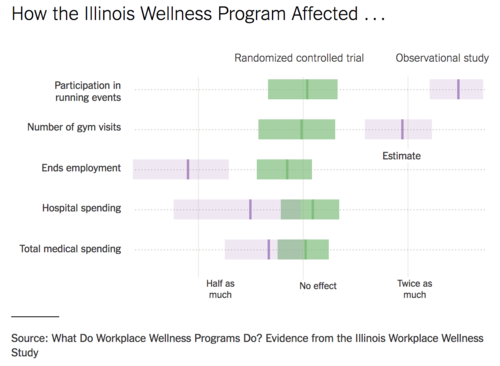Chance News 114: Difference between revisions
| Line 27: | Line 27: | ||
by Aaron E. Carroll, ''New York Times'', "TheUpshot" blog, 6 August 2018 | by Aaron E. Carroll, ''New York Times'', "TheUpshot" blog, 6 August 2018 | ||
[[File:IllinoisWellness.png| | Compares results of observational studies with subsequent randomized trials. In a number of cases, the effects found in the earlier studies are seen to disappear. Article includes the following graphic: | ||
<center>[[File:IllinoisWellness.png|500px]]</center> | |||
Revision as of 15:41, 8 August 2018
July 1, 2018 to ...
Quotations
Forsooth
“That means then that criminal aliens are committing 28 percent of the crimes in the United States. And so that means 28 percent of the murders, 28 percent of the rapes, 28 percent of the violence and the assaults and battery, first- and second-degree murder and also manslaughter attacks are committed by criminal aliens.”
How likely is "likely"?
If you say something is “likely,” how likely do people think it is?
by Andrew Mauboussin and Michael J. Mauboussin, Harvard Business Review, 3 July 2018
Counting LA's homeless
More sidewalk tents, but fewer people living in them? The 2018 homeless count's new math
by Dakota Smith and Doug Smith, Los Angeles Times, 15 July 2018
Plastic straws
How a 9-year-old boy’s statistic shaped a debate on straws
by Niraj Chokshi, New York Times, 19 July 19 2018
Alzheimer's drug study
Why the latest Alzheimer’s drug study has so many people confused
by Clifton Leaf, Fortune, 30 July 2018
Workplace wellness programs
Workplace wellness programs don’t work well. Why some studies show otherwise
by Aaron E. Carroll, New York Times, "TheUpshot" blog, 6 August 2018
Compares results of observational studies with subsequent randomized trials. In a number of cases, the effects found in the earlier studies are seen to disappear. Article includes the following graphic:
